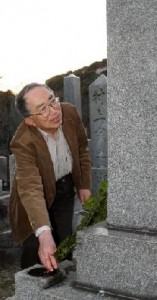Nuclear Weapons Can Be Eliminated: Chapter 9, Part 2
Apr. 16, 2010
Chapter 9: Messengers from Hiroshima
Part 2: Takayoshi Kajiyama
by Sakiko Masuda, Staff Writer
About 2,000 people from Japan, including roughly 100 from Hiroshima, among them A-bomb survivors (hibakusha), will head to the United States in time for the Nuclear Non-proliferation Treaty (NPT) Review Conference to be held at U.N. headquarters in New York from May 3-28. They will visit the United States to appeal for the necessity of eliminating nuclear weapons. The Chugoku Shimbun will track their hopes and resolve with regard to the NPT Review Conference as well as the feelings of those who cannot visit the United States due to advanced age or poor health.
Takayoshi Kajiyama, 68, a resident of Fuchu-cho, Hiroshima Prefecture, stood before the graves of his father and mother at the cemetery in Hijiyama Hill Park in Minami Ward, Hiroshima.
On April 16, Mr. Kajiyama will join the "Global Voyage for a Nuclear Weapons Free World," which has been organized by Peace Boat, a Tokyo-based nongovernmental organization (NGO). Nine A-bomb survivors (hibakusha), including Mr. Kajiyama, and a second-generation A-bomb survivor will board the ship and journey to 20 nations over a period of three months, including China, Vietnam, and Russia. They will describe the devastation of the atomic bombing at ports of call and on the ship.
As yet, however, Mr. Kajiyama has not spoken about his A-bomb experience in public. He explained that, over the years, he had been so preoccupied with work that he could not afford to pursue relating his account of the bombing, which lingered in the back of his mind. But after leaving his workplace last September, a new life with more spare time has brought about a fresh resolve. "A lot of people have helped me," he said. "Now I want to be of some help for peace."
It happened on the morning of August 6, 1945. The explosion, which he heard at his home in Hijiyama Honmachi (now, Minami Ward), still rings in his ears. "It felt like everything was crashing down," recalled Mr. Kajiyama. His mother was cooking at the time and glass fragments from the shattered windows of the house pierced her body. She was loaded onto a truck that was carrying the injured and has been missing ever since. Her remains have never been found.
His father died during the war in Southeast Asia in April of the same year.
Mr. Kajiyama was just three years old at the time and has no memory of his parents. He survived the post-war period with his older brother and grandparents. Mr. Kajiyama helped his grandfather with woodwork and found employment after graduating from junior high school. Four years later, he attended night school to complete his high school degree. The younger brother of Yoshiko Ishii, a chanson singer, and his wife became Mr. Kajiyama's "moral parents" and provided him with support. Mr. Kajiyama is still attached to the couple, calling them "Father" and "Mother."
Encouraged by his family, Mr. Kajiyama decided to join the Peace Boat voyage. His older brother's wife, Toshiko, 68, the owner of an okonomiyaki restaurant [a kind of crepe made with meat and cabbage] also lost her mother in the atomic bombing. She took part in a similar Peace Boat voyage in 2008.
"My sister-in-law has a deep desire to see nuclear weapons eliminated," said Mr. Kajiyama. "I have the same wish. So many innocent lives were lost in a flash. I still find it horrifying. If it hadn't been for that bomb, my life would have been very different."
He went on, sharing his hopes for the approaching voyage. "I look forward to finding out what people in other countries think about Hiroshima and Nagasaki. In the process of learning their ways of thinking, I believe I'll discover what I can do to support the abolition of nuclear weapons."
During the voyage, two hibakusha will leave the vessel and head to New York where the Nuclear Non-proliferation Treaty (NPT) Review Conference is set to be held. Though Mr. Kajiyama will not serve as one of the two hibakusha in this role, his message will be conveyed by his fellow survivors. "The antinuclear movement is stronger than ever," he said. "The appeal from the A-bombed city will surely resonate in people's hearts."
(Originally published on April 14, 2010)
To comment on this article, please click the link below. Comments will be moderated and posted in a timely fashion. Comments may also appear in the Chugoku Shimbun newspaper.








